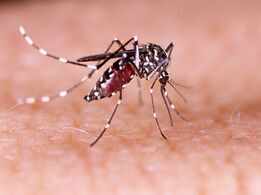01/7Getting vaccinated against COVID-19 is a way to safeguard yourself
)

From mitigating severity, hospitalization and mortality risks associated with emerging COVID-19 variants, the current vaccines have been proven to be well-effective and beneficial against COVID-19. While they have been experimentally built, their development and promise have been hailed to be 'ground-breaking' by many.
ALSO READ: Immunity from infection or vaccines, which lasts longer?
But how well do we know that COVID-19 vaccines are safe in the long run?
02/7Could there be any potential risks or long-term side-effects?
)

While hesitancy, scepticism and discovery of rare side-effects, including myocarditis, heart inflammation, blood clotting risk and neurological complications make many wary of their usage, scientists and medical experts continue to support that COVID-19 vaccines are not just safe for use but also counter the many risks that lie with a COVID infection, essentially outlining that the benefits outweigh the cons and essentially, good in the long run too.
ALSO READ: Only 10% people need hospitalization aftter being vaccinated, says ICMR
Vaccine developers are still working to roll out universal, more effective and upgraded versions of current COVID-19 vaccines. Even then, the vaccines we have are equally promising and do not pose risks in the long run. We list out five reasons as to why this is true:
03/7Vaccines are clinically tested to be effective in the long run
)

COVID-19 vaccines, much like other vaccines have undergone many rounds of study, development and clinical testing.
While the COVID-19 vaccine works to strengthen the body's immune defence and mitigate infection risks, some of the vaccine models or vaccines on some people have now been proven to be more effective, and capable of mounting long-lasting protection. Recent evaluations have suggested that mRNA vaccines, which use a prototype to create a harmless fragment similar to the actual spike protein of the SARS-COV-2 virus are more powerful than other vaccines in mounting a long-term (may even be lifetime) antibody response, and considerably cutting down poorer outcomes with the disease.
There are currently more vaccines being developed, and plans are being ambitiously made to bring out an upgraded- all rounder vaccine that works against all coronavirus variants. The vaccines we have currently have also been proven to be quite effective, and extremely well-tolerated, which mitigate fears.
04/7Side-effects, if any, show up in the weeks following, not long after vaccination
)

Guillan-Barre Syndrome, increased blood clots, myocarditis, or anaphylaxis, there are some safety concerns, and adverse reactions, as they are called, with COVID-19 vaccines. Some flare-up risks also come up with other vaccinations.
However, from what has been seen, and documented, most of these serious-natured side-effects tend to show up weeks following vaccination, and not long after. Preliminary research suggests that the side-effects, which have consequential risks are most likely to be seen following widespread use, most commonly a month after inoculation, which is a shorter interval.
Therefore, not only can the side-effects be managed if diagnosed in time, no possible side-effects, which are detrimental to our health and well-being have been currently witnessed.
More so, the risks and severe side-effects which have been associated with COVID-19 vaccines are fewer than reported averages across the general population. For example, the risk of developing blood clots is severe with a COVID-19 infection itself. Similarly, the risk of developing Guillain Barre Syndrome ( a rare autoimmune condition where the system attacks healthy tissues and nerves) is said to be 17 times more likely with general infections, in comparison to vaccines.
05/7Vaccines are safer to use than medicines
)

An argument that anti-vaxxers often make is that COVID-19 vaccines can be unsafe for use in the long run since the injection tweaks genetic DNA or leads to significant changes that impact us. However, even with the administration, vaccines are relatively safer for use than some of the medicines we have.
While medicines do tend to carry along some side-effects and safety risks as well and need to be used for longer durations (regularly), vaccines are usually injected once, and get eliminated quicker. The medications can often create side-effects in the long run that show up later but are still advocated for use and beneficial for healthy living. In comparison, vaccines lead to reactogenic side-effects, mostly mild and resolvable in nature. Once the vaccine is injected, it trains the immune system, doles out antibodies which then causes inflammatory, temporary reactions and degrade over time. Thus, the risk of long-term side-effects is negligible and unheard of.
06/7Long-term side-effects of a COVID infection are more consequential
)

Not only are long-term side-effects with a COVID-19 vaccination rarely heard or known of, but the risks of long-term complications and vulnerabilities with a COVID-19 infection are also far-reaching and impactful. The benefits of vaccination, do relatively outweigh the cons.
So far, not only has COVID-19 been associated with at least 100 different symptoms, scientists have stressed that testing negative isn't the real end of a battle. From long COVID risk, psychological damage, stress, heart health, digestion problems, fatigue, and other heightened complications, a COVID infection, especially if severe, could be quite scarier.
07/7We now have proof that vaccination against COVID works
)

Lastly, it is important to note that while there's still a long way to go in immunizing larger sections of the population, we have come a long way since COVID-19 vaccines were first pushed into use.
While countries like the UK and the US started to inoculate sections in December 2020 (even earlier in Russia and China), India kickstarted its vaccination drive in January 2021. We have surpassed the 6-month mark, and going by real-time data, and clinical studies, we now have enough evidence to prove that vaccines are well-effective, and pose no risks. The side-effects , and the benefits have also been relatively safer with all vaccines used globally and hence, it's crucial to do away with fears and hesitancies and weigh the pros over the cons.












































































![[New!] Level 4 - 30 minute tempo fat-burning!
[New!] Level 4 - 30 minute tempo fat-burning!](https://static.toiimg.com/thumb/79327298.cms?width=147&height=86)













closecomments
SIGN IN WITH
FacebookGoogleEmail